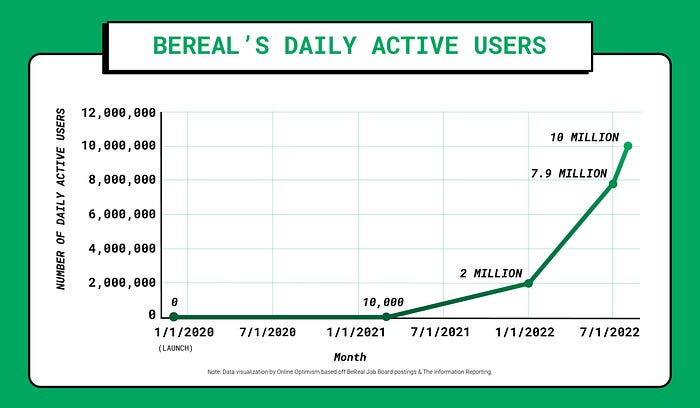

Why the “iPhone App of the year” made $0 in 2022
source link: https://uxdesign.cc/the-winner-of-the-iphone-app-of-the-year-award-made-a-whopping-total-of-0-in-2022-ff53242f3f0c
Go to the source link to view the article. You can view the picture content, updated content and better typesetting reading experience. If the link is broken, please click the button below to view the snapshot at that time.

You have 2 free member-only stories left this month.
Why the “iPhone App of the year” made $0 in 2022
How “BeReal” became an overnight sensation with minimalist design and zero revenue.

What if social media was actually authentic?
French techies Alexis Barreyat and Kevin Perreau decided to find an answer to this question back in 2020 when they launched BeReal, a photo-sharing app that allows users to post one photo a day to show what they’re up to in real-time.
The idea was simple enough:
A buzzer goes off at a randomly selected time, and you’re given 2 minutes to respond with a photo of what you’re doing in the moment. No filters allowed.

You might be wondering:
Why introduce yet another social media app when we are quite literally drowning with the number of platforms we’re supposed to keep up with?
BeReal was an idea that spawned from Barreyat and Perreau’s observations that social media was no longer being used the way it was intended to.
When Instagram first came out, your feed was likely filled with innocent pictures of food, animals, or friends with a lazily slapped-on in-app filter, if any at all. With the current influencer economy, Instagram has been monetized to the point of users spending the majority of their time on the app sifting through frustrating targeted ads or overly-edited, unrealistic bikini pictures from micro-celebrities.
Whereas Facebook and other social media giants profit off addiction and competitiveness, BeReal could be one of, if not, the first of its kind to maintain engagement primarily off the genuine enjoyment of users.
The company states:
“We want to make people feel good about themselves and their lives. We want an alternative to addictive social networks fueling social comparison and portraying life with the goal of amassing influence.”
The monumental adoption of the app worldwide suggests that society may have been yearning for a social media alternative like BeReal for a long time.

It’s worth noting that it took until two years after BeReal’s release for the app to truly resonate with users and garner so much press. Yet this may not be surprising at all, as the concept of the app is admittedly a bit strange.
Before the age of BeReal, if you were told an app required you to post content daily, you might be thinking: “Well, what’s the point of that? My life is kind of boring.” After all, how often are we actually doing the fun and exciting things we post on Instagram — going to weddings, graduating, or jumping out of planes — to name a few. Most of our day-to-day lives are actually, not exciting at all.
BeReal is pretty emblematic of real life. Maybe one or two of your following each day is caught in a good light, but most of us are doing everyday things. Staring at Zoom. Waiting in the grocery line. Picking up laundry.
In parallel to its content, BeReal’s design is pretty simple as well. There’s no tagging and very minimal information to find in someone’s profile, such as previous posts or a numbered following list.
Without any sponsored content, BeReal has not yet accrued any revenue. Despite this, the app was recently valued at just under $600 million.
It’s not yet clear if the app will sustain or continue to grow its following with such a simple and repetitive user experience. It’ll be interesting to see how the app attempts to create revenue without damaging one of the most promising features that attracts users: the absence of unnecessary ads.
At the very least, if and when the app inevitably dies out, we can remember BeReal as a time when users rebelled against the pressure to have a picture-perfect lifestyle and hope this generates a wave of new social media alternatives for younger, more susceptible audiences.
Recommend
About Joyk
Aggregate valuable and interesting links.
Joyk means Joy of geeK